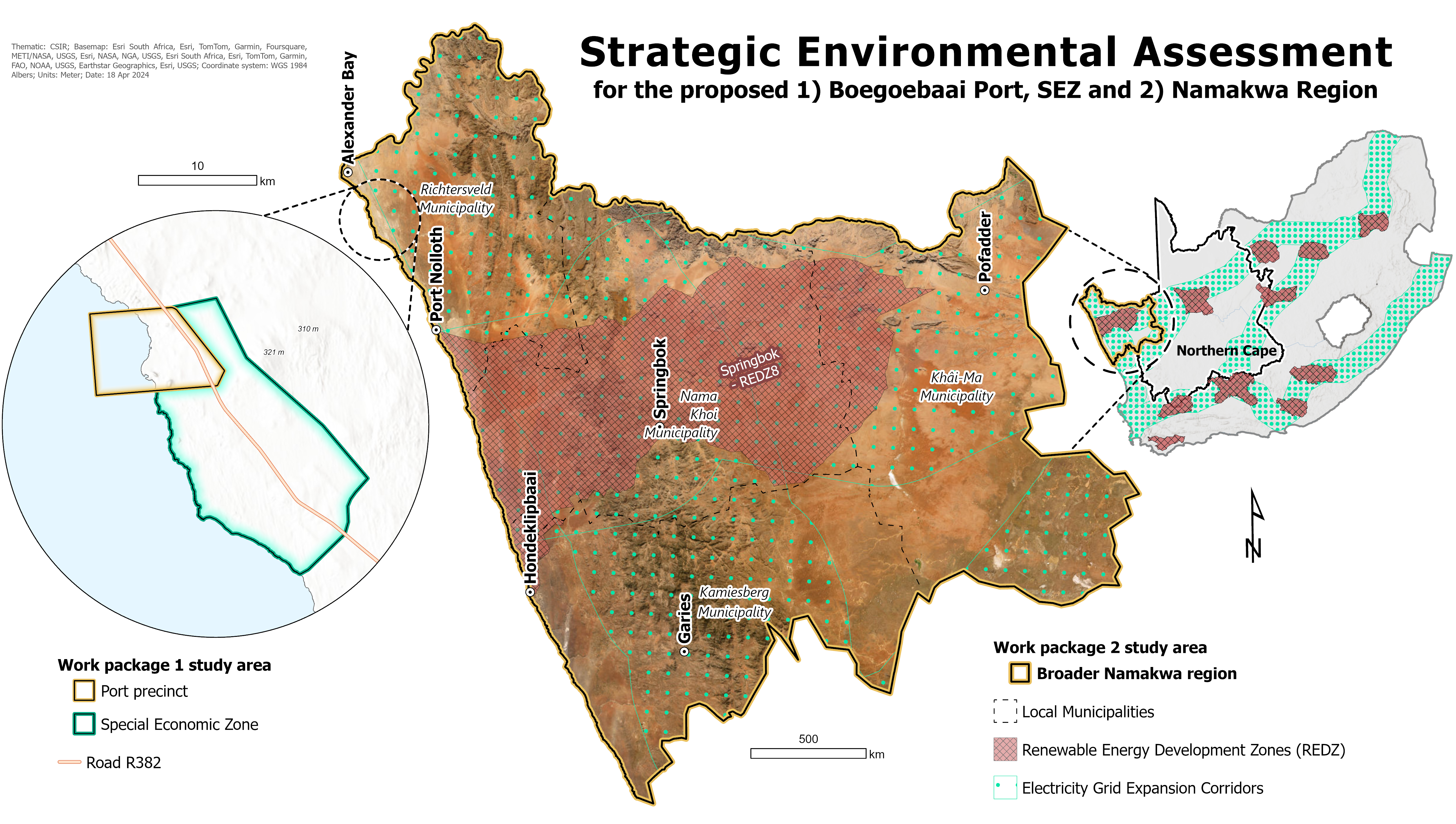The CSIR is leading the strategic environmental assessment (SEA) that is being undertaken for the Northern Cape’s plan to produce green hydrogen in a proposed new special economic zone (SEZ), as well as a port at Boegoebaai and other infrastructure.
The spatial area for the strategic environmental assessment includes the proposed port, the associated SEZ adjacent to the port and the broader Namakwa region. A local-scale SEA study will cover the sustainability of the proposed port and SEZ development in an area of approximately 33 500 hectares, while a regional-scale SEA study will cover sustainability issues associated with the Northern Cape green hydrogen economy for the Namakwa area, delineated by the local municipalities of Richtersveld, Nama Khoi, Kamiesberg and Khâi-Ma.
The SEA process will have a holistic approach that includes biophysical and socio-economic aspects at a strategic level. It will include independent expert teams that will contribute their expertise on domains such as marine ecology and biodiversity (including coastal birds), terrestrial ecology and biodiversity, terrestrial birds and bats, surface and groundwater, sustainable port planning, fisheries and coastal livelihoods, conservation planning, regional planning (including human movement and infrastructure) and socioeconomics associated with this development.
Paul Lochner, leader of the CSIR’s Environmental Management Services group and seasoned environmental practitioner, says a strategic environmental assessment in the context of a regional hydrogen economy in the Northern Cape, is especially necessary.
“Globally, there is strong interest in the potential for green hydrogen to replace fossil fuels, particularly in sectors where it is difficult to reduce fossil-fuel based emissions such as aviation, shipping and bulk transport. These sectors are crucial to meeting climate change commitments. The proposed generation of green hydrogen at Boegoebaai would be for export and local use,” Lochner says.
The overall objective of the SEA is to develop an integrated decision-making framework to guide the planning of the proposed Boegoebaai port, SEZ, and wider Namakwa region in a sustainable manner. Some of the aspects that the assessment will cover include identifying the sensitivity of the receiving environment, potential fatal flaws that need to be addressed early in the planning process, strategic-level opportunities and constraints, and strategic management actions. The SEA does not replace the legal requirement for project-level environmental impact assessment.
“The CSIR has been instrumental in the introduction and evolution of strategic environmental assessments in South Africa. Our competency in these assessments is widely recognised, and we are committed to provide independent science-based information and advice into the decision-making process in a transparent manner,” he says.
The CSIR project team consists of project leader Paul Lochner, project manager Babalwa Mqokeli, stakeholder engagement facilitator Lizande Kellerman, geo-spatial specialist Luanita Snyman-van der Walt, and project advisor Dr Greg Schreiner.
On 23 May 2024, the CSIR, the Northern Cape Economic Development Trade and Investment Promotion Agency (NCEDA), the South African National Energy Development Institute (SANEDI) and the Transnet National Ports Authority were joined by approximately 40 stakeholders representing non-government organisations, community-based organisations, the government, academic research and the private sector to guide and inform best-practice science-policy processes and facilitate the co-production of knowledge content that will be used to inform decision-making for sustainable development in the Northern Cape.

-ENDS-
Issued by CSIR Strategic Communications
For more information, contact:
Phetolo Phatsibi: Media Relations Practitioner
Email: @email
Mobile: 071 382 4055 / 0813968871
About the CSIR:
The CSIR, an entity of the Ministry of Higher Education, Science and Innovation, is one of the leading scientific and technology research, development and implementation organisations in Africa. Constituted by an Act of Parliament in 1945 as a science council, the CSIR undertakes directed and multidisciplinary research and technological innovation, as well as industrial and scientific development to improve the quality of life of all South Africans. For more information, visit www.csir.co.za
Follow us on social media:
Twitter: @CSIR. Facebook: CSIRSouthAfrica. Instagram: CSIRSouthAfrica. LinkedIn: Council for Scientific and Industrial Research (CSIR). YouTube: CSIRNewMedia
Contact Person: Phetolo Phatsibi, @email, 0713824055